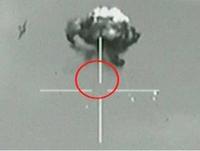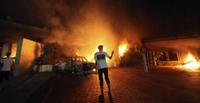-
Two suspected 2010 North Korea nuclear “tests” probably never happened: study

It is generally accepted that North Korea has carried out at least two nuclear test explosions, in 2006 and 2009, with the second test — thought to be in the range of about two to four kilotons — was five times more powerful than the first; this spring, a Swedish scientist sparked international concern when he said that radioactive particles detected in 2010 showed North Korea had set off at least two small nuclear blasts that year; now, a new paper says the tests likely never took place — or that if they did, they were too tiny to have any military significance
-
-
Congressional panel says two Chinese telecom companies pose “national security threat” to U.S.

A report by the House Intelligence Committee recommended that the U.S. government be barred from doing business with two Chinese telecommunications firms – Huawei and ZTE – and that American companies should avoid buying their equipment; a committee report said the two companies pose a threat to U.S. national security; installing these companies’ technology in U.S. communication network will not only allow these companies, acting on behalf of the Chinese military and intelligence, to steal sensitive national security information and trade secrets of private U.S. companies – it will also allow China to attack and paralyze large portions of U.S. critical infrastructure
-
-
Defense firms growing anxious about sequestration-related defense cuts
Defense contractors are growing anxious as they still do not know whether $500 billion in defense cuts will take place on 1 January 2013 as a result of sequestration; many firms are hoping that the administration and Congress will come to a budget agreement once the election is over, but at the same time, it is something contractors cannot rely on; what complicates the issue is the Worker Adjustment and Retraining Notification Act (WARN), which requires employers with more than 100 employees to give employees a 60-day notice before mass lay-offs or plant closure
-
-
Scenario-based gaming exercise to improve intelligence analysis
Raytheon has created a scenario-based gaming exercise to study in depth the intelligence analyst’s tradecraft; the company says the goal is ultimately to help analysts produce the best intelligence products and streamline workflows
-
-
NRC sees no evidence of bad security practices at Michigan nuclear plant

The Nuclear Regulatory Committee (NRC) released information last week about a leak earlier this summer at the Palisades plant near South Haven, Michigan; the plant has been mired in controversy this year, as at least three water leaks have occurred in the past several months, and the plant has one of the worst safety ratings in the United States
-
-
Environmentalists concerned about earthquakes tests near California nuclear plant
The Pacific Gas and Electric Company (PG&E) wants to use air guns to emit strong sound waves into a large near-shore area which includes parts of marine reserves; the purpose: creating three dimensional maps of fault zones near its Diablo Canyon nuclear plant in California; the plans have federal and state officials concerned about marine life and public safety
-
-
Hezbollah drone shot down over Israel

The Israel Air Force (IAF) planes shot down a UAV over the north Negev; the UAV entered Israeli air space from the west, but Israeli intelligence says the drone was launched by Hezbollah in Lebanon, then made its way south over the Mediterranean, then turned east when it reached the water off the Gaza Strip
-
-
Small airports face reduction in TSA funding for security measures
The Transportation Security Administration (TSA) is reducing funding designated to help smaller airports provide law enforcement officers at passenger screenings; since the 9/11 attacks, the TSA mandated that one law enforcement officer be present when commercial passengers are screened at airports; the TSA has now changed the way it circulates funding for this program, reducing the number of hours an officer has to work and the amount he or she will be paid
-
-
Jewish Community Homeland Security Primer distributed to law enforcement agencies
Amidst the Jewish High Holidays, the Secure Community Network (SCN), the national homeland security initiative of the Jewish Federations of North America and the Conference of Presidents, distributed what SCN described as “a first ever” homeland security briefing primer for American law enforcement and homeland security agencies and national security partners across the United States
-
-
FBI investigators visit Benghazi consulate compound

After a delay of more than a week owing to security concerns, a team of several FBI investigators earlier this week visited the burned-down U.S. diplomatic compound in Benghazi to gather more information on the attack which killed Ambassador Stevens; the Department of State has created a 5-member independent investigative panel, the Accountability Review Board, to look into security arrangements at the compound, and to determine whether those arrangements were sufficient, and whether information about the deteriorating security situation in the city was ignored
-
-
The administration set to issue a cybersecurity executive order

President Obama issued a proclamation the other day making October National Cyber Security Awareness month. The administration’s efforts to push a cybersecurity bill through Congress, however, have so far failed, so the administration is opting for a solution other administrations have adopted in the face of a recalcitrant Congress: executive order
-
-
Electronic surveillance by U.S. law enforcement agencies has increased dramatically

According to data obtained by the American Civil Liberties Union (ACLU), U.S. law enforcement’s surveillance of e-mails and other Internet communication has skyrocketed in the last two years; some forms of surveillance have increased 361 percent
-
-
Senate panel’s report harshly criticizes role, utility of DHS fusion centers
A 2-year bipartisan investigation by the U. S. Senate Permanent Subcommittee on Investigations has found that DHS efforts to engage state and local intelligence “fusion centers” has not yielded significant useful information to support federal counterterrorism intelligence efforts; the report says that senior DHS officials were aware of the problems hampering effective counterterrorism work with the fusion centers, but did not always inform Congress of the issues, nor ensure the problems were fixed in a timely manner; DHS estimates that it has spent somewhere between $289 million and $1.4 billion in public funds to support state and local fusion centers since 2003 (the report says that these are broad estimates which differ by over $1 billion); the Senate investigation raises questions about the value this amount of funding and the contribution the fusion centers make to the U.S. counterterrorism efforts; not everyone agrees with the report; Rep. Peter King (R-NY), chairman of the House Committee on Homeland Security, said: “I agree with Chairman Joe Lieberman and Ranking Member Susan Collins [of the Senate Committee on Homeland Security] that the subcommittee report issued this week paints with too broad a brush an incomplete picture that fails to recognize many of the important contributions that fusion centers have made in securing our Homeland”
-
-
Oregon terrorism suspect’s request to learn identity of government informant rejected

Mohamed Mohamud, a 21-year old Somali born Oregon resident, is accused of attempting to bomb Portland, Oregon’s 2010 holiday tree-lighting ceremony; a request by Mohamud and his defense team to learn the true identity of a government informant known only as “Bill Smith” was denied by U.S. District Judge Garr King
-
-
Obama blocks purchase of U.S. wind farms by Chinese company

Last Friday President Barack Obama blocked a Chinese company from owning four wind farm projects in northern Oregon; Obama cited security risks for the action, making it the first time in twenty-two years that a U.S. president has blocked a foreign business deal
-
More headlines
The long view
Factories First: Winning the Drone War Before It Starts
Wars are won by factories before they are won on the battlefield,Martin C. Feldmann writes, noting that the United States lacks the manufacturing depth for the coming drone age. Rectifying this situation “will take far more than procurement tweaks,” Feldmann writes. “It demands a national-level, wartime-scale industrial mobilization.”
No Nation Is an Island: The Dangers of Modern U.S. Isolationism
The resurgence of isolationist sentiment in American politics is understandable but misguided. While the desire to refocus on domestic renewal is justified, retreating from the world will not bring the security, prosperity, or sovereignty that its proponents promise. On the contrary, it invites instability, diminishes U.S. influence, and erodes the democratic order the U.S. helped forge.
Fragmented by Design: USAID’s Dismantling and the Future of American Foreign Aid
The Trump administration launched an aggressive restructuring of U.S. foreign aid, effectively dismantling the United States Agency for International Development (USAID). The humanitarian and geopolitical fallout of the demise of USAID includes shuttered clinics, destroyed food aid, and China’s growing influence in the global south. This new era of American soft power will determine how, and whether, the U.S. continues to lead in global development.
Water Wars: A Historic Agreement Between Mexico and US Is Ramping Up Border Tension
As climate change drives rising temperatures and changes in rainfall, Mexico and the US are in the middle of a conflict over water, putting an additional strain on their relationship. Partly due to constant droughts, Mexico has struggled to maintain its water deliveries for much of the last 25 years, deliveries to which it is obligated by a 1944 water-sharing agreement between the two countries.
How Disastrous Was the Trump-Putin Meeting?
In Alaska, Trump got played by Putin. Therefore, Steven Pifer writes, the European leaders and Zelensky have to “diplomatically offer suggestions to walk Trump back from a position that he does not appear to understand would be bad for Ukraine, bad for Europe, and bad for American interests. And they have to do so without setting off an explosion that could disrupt U.S.-Ukrainian and U.S.-European relations—all to the delight of Putin and the Kremlin.”
How Male Grievance Fuels Radicalization and Extremist Violence
Social extremism is evolving in reach and form. While traditional racial supremacy ideologies remain, contemporary movements are now often fueled by something more personal and emotionally resonant: male grievance.
